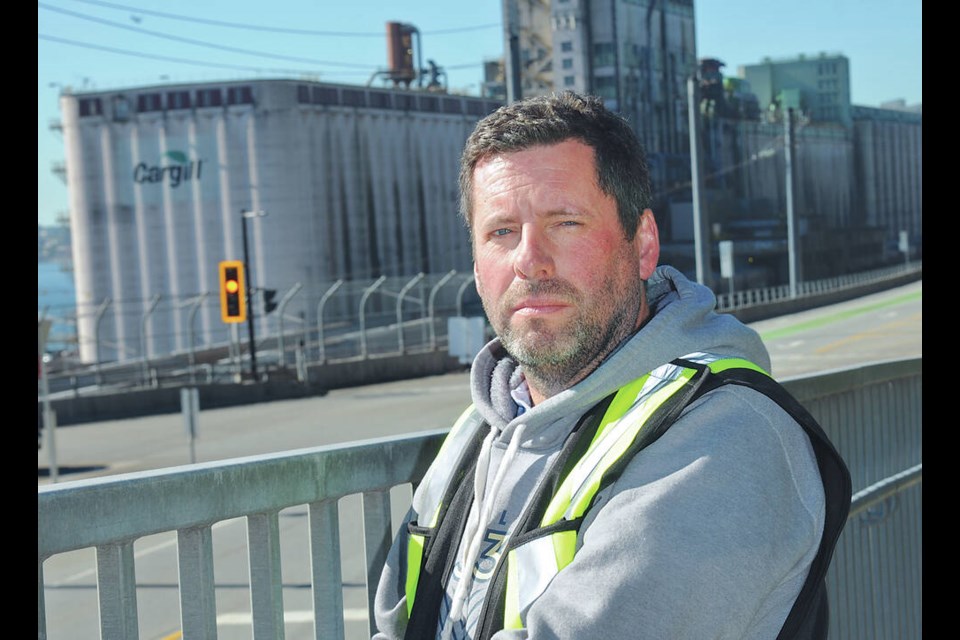Unionized workers at North Vancouver’s Cargill Canada grain terminal are sounding the alarm over concerns that overheating grain silos are at risk of a potentially catastrophic fire and explosion.
In April, residents along the waterfront in North Vancouver , which Metro Vancouver air quality investigators terminal on Low Level Road.
Unless it is moved frequently, grain inside a silo naturally begins to decompose, which causes it to produce heat as a byproduct – enough that the grain may start to smoulder and eventually combust.
Cargill Canada has been allowing grain to sit too long without being rotated or moved, said Grain Workers Union Local 333 president Douglas Lea-Smith. Now he and other union members are “incredibly” worried about the risk that presents.
“We have people leaving the industry because of it. It keeps me up at night. It’s a very real possibility,” he said. “I grew up on the North Shore and the community deserves to know and be protected as much as the workers do.”
One small explosion or fire could knock loose years’ worth of grain dust and suspend it in the air, creating the conditions for a much more dangerous secondary explosion, Lea-Smith said.
That’s exactly what happened in October 1975, at the Burrard Terminal, where Richardson International’s grain silos are today. In that case, a fire on a conveyor belt ignited grain dust, which sent concrete and embers falling into the nearby Moodyville neighbourhood.
One of those killed was the father of Lea-Smith’s friend.
“It was devastating,” Lea-Smith said. “I think we’re getting closer and closer to that event unless there’s a change in how they do business.”
According to statistics from the U.S. Department of Labour, there were 503 grain elevator explosions between 1978 and 2008, resulting in 184 deaths.
Cargill did not make anyone available for an interview, but the company did provide a statement explaining how the bin came to overheat.
“We are currently storing grain cleanings at this facility. The grain cleanings do not always flow as smoothly as grain, which can allow it to heat up and can cause it to smoulder. We monitor our bins closely and have hired a specialized contractor to clean out this bin,” the statement read. “We are also engaging another contractor, who will be on-site Oct. 16, to ensure all of our bins are flowing correctly and are cleaned out appropriately. We are also monitoring the atmosphere at the facility at all times. Safety is a key priority for Cargill. We continuously monitor our facility to ensure the safety of our employees and our neighbours.”
In an email, North Vancouver City Fire Department Chief Greg Schalk said he was satisfied with the steps being taken by Cargill.
“The fire department is aware of the current operational issue at Cargill and we are comfortable with the action plan that has been developed and deployed by its industry subject matter expert to address. There are federal standards governing grain storage,” he said.
Despite the current plans, Lea-Smith said the union is pushing to have Cargill allow for the time and staffing to keep the grain in the bins being moved frequently and the bins cleaned regularly. There are other bins at the terminal that are off-gassing, which is a sign that smouldering will follow, he said.
“There are more bins like this. It’s going to happen more and more,” he said.
Because the port is under federal jurisdiction, WorkSafe小蓝视频 is not involved in the matter and Cargill’s safety committee, which is made up of union members and company representatives, has been working with the federal regulator Employment and Social Development Canada.
Under the Canadian Labour Code, unionized workers have the right to refuse unsafe work. But if the company has produced a safety plan, which Cargill has, ESDC won’t rule in a union’s favour, Lea-Smith said.
In a statement, Employment and Social Development Canada acknowledged there had been a complaint filed about Cargill due to one incident in 2023 and that the investigation had been completed and the case closed. For confidentiality reasons, the results of ESDC investigations are only released to the parties involved and not to the public.
“No Canadian should go to work fearing for their health and safety,” the statement read.
The federal regulator needs to be more involved, Lea-Smith said.
“They’re more of a bureaucratic thing than an on-the-ground thing,” he said.
Lea-Smith said the culture of the grain industry changed for the worse after Stephen Harper’s Conservative government privatized the Canadian Wheat Board in 2012.
“Even though they’re in the grain business, they seem to be more focused on receiving grain than maintaining safety and quality of worksite,” he said. “[Grain terminals] can be safe. They just need to be properly maintained. And they need to be regulated. [Companies] can’t just be left to their own devices because that’s a race to the bottom.”



